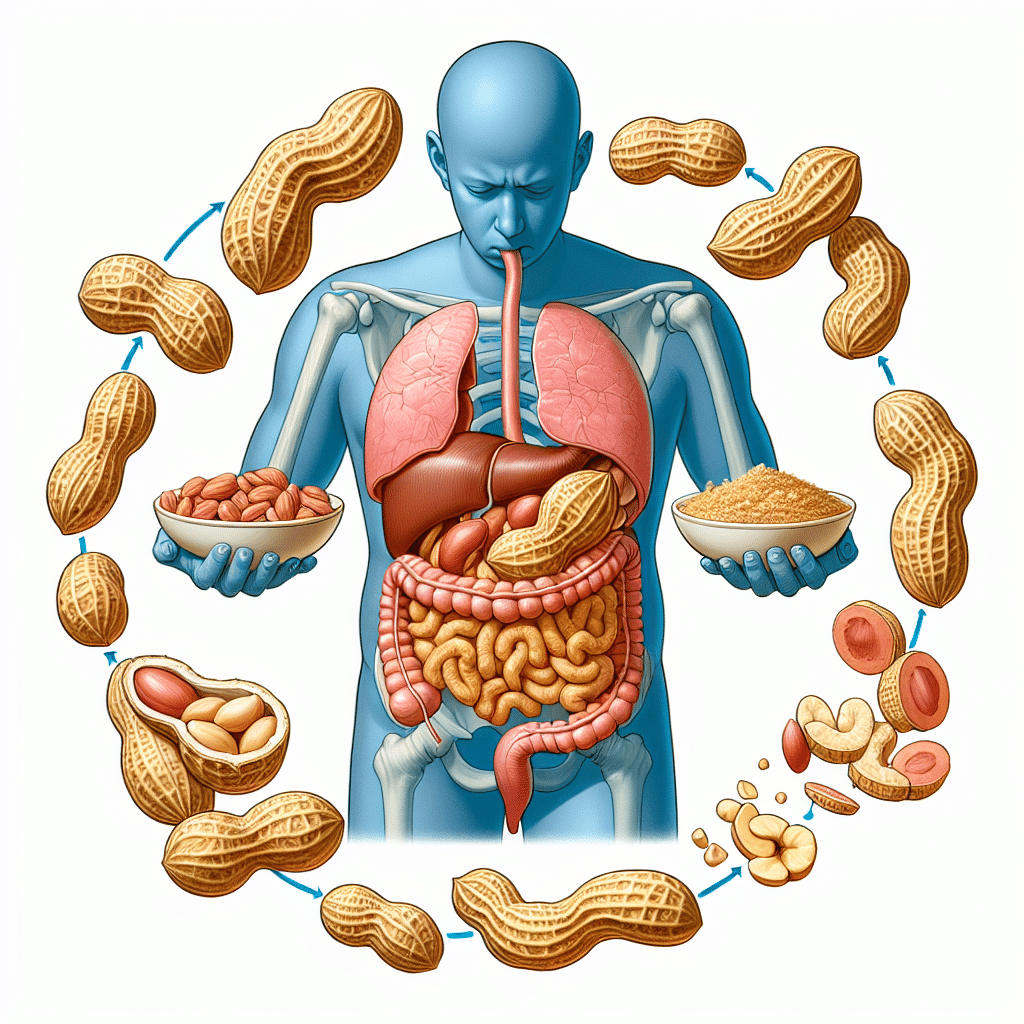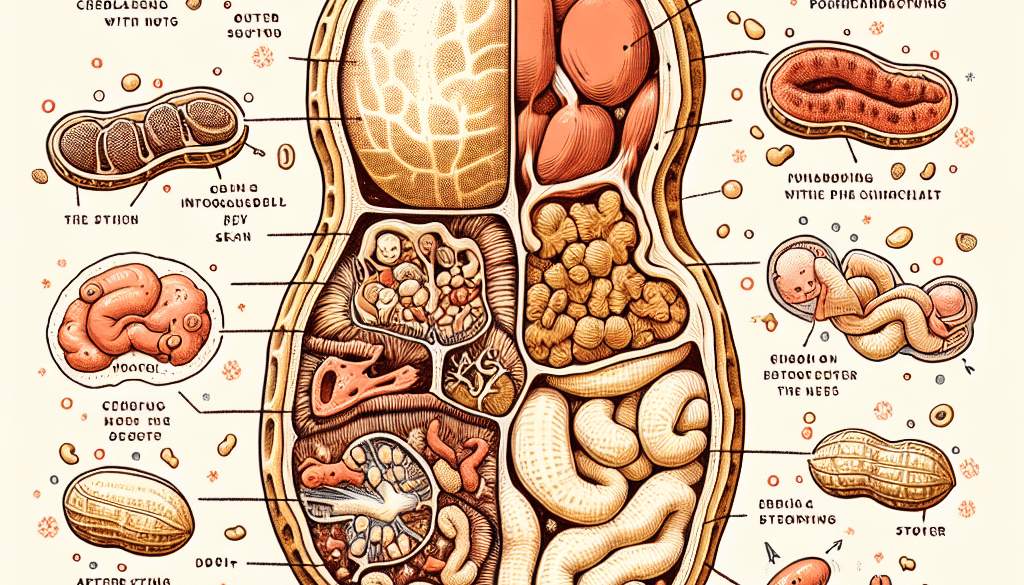Are Peanuts Hard to Digest? Unpacking The Nutty Truth
-
Table of Contents
- Are Peanuts Hard to Digest? Unpacking the Nutty Truth
- Understanding Peanut Digestion
- The Composition of Peanuts
- Anti-Nutritional Factors in Peanuts
- Individual Digestive Health and Peanuts
- Impact of Peanut Allergies
- Effects on Individuals with IBS
- How to Improve Peanut Digestibility
- Proper Preparation and Consumption
- Combining Peanuts with Other Foods
- Case Studies and Research on Peanut Digestion
- Statistical Data on Peanut Digestibility
- Conclusion: The Digestive Verdict on Peanuts
- Discover ETprotein’s Nutritious Protein Products
Are Peanuts Hard to Digest? Unpacking the Nutty Truth

Peanuts are a staple in many diets around the world, known for their rich flavor and high nutritional value. They are packed with protein, healthy fats, and various vitamins and minerals, making them a popular choice for snacking and as an ingredient in numerous dishes. However, there’s a common question that often arises: Are peanuts hard to digest? This article delves into the digestive aspects of peanuts, exploring the factors that affect their digestibility and the implications for your health.
Understanding Peanut Digestion
Before we can answer whether peanuts are hard to digest, it’s important to understand the digestive process. Digestion is a complex series of events that breaks down food into its constituent nutrients, which the body can then absorb and use. Factors that influence the digestibility of a food include its physical structure, nutrient composition, and the presence of anti-nutritional factors.
The Composition of Peanuts
Peanuts are composed of proteins, fats, carbohydrates, fiber, and various micronutrients. The high fat and protein content in peanuts can slow down the digestive process because these macronutrients take longer to break down compared to carbohydrates. Additionally, peanuts contain dietary fiber, which is beneficial for digestion but can also contribute to their perceived difficulty in digesting if consumed in large quantities.
Anti-Nutritional Factors in Peanuts
Anti-nutritional factors are compounds that can interfere with the absorption of nutrients or the digestion of food. Peanuts contain phytic acid, which can bind to minerals and reduce their bioavailability. However, the impact of phytic acid on mineral absorption is generally a concern only when diets are heavily reliant on high-phytate foods without adequate mineral intake.
Individual Digestive Health and Peanuts
Individual digestive health plays a significant role in how well one can digest peanuts. People with certain digestive conditions, such as irritable bowel syndrome (IBS) or peanut allergies, may find peanuts particularly challenging to digest.
Impact of Peanut Allergies
Peanut allergies are one of the most common food allergies and can cause severe reactions, including anaphylaxis. For individuals with peanut allergies, the immune system mistakenly identifies proteins in peanuts as harmful, triggering an allergic reaction that can affect digestion and overall health.
Effects on Individuals with IBS
For those with IBS, peanuts may exacerbate symptoms due to their fiber content. While fiber is generally recommended for digestive health, some individuals with IBS may experience discomfort after consuming high-fiber foods like peanuts.
How to Improve Peanut Digestibility
There are several ways to enhance the digestibility of peanuts, making them a more comfortable addition to your diet.
Proper Preparation and Consumption
- Chewing thoroughly: Properly chewing peanuts can significantly aid in digestion by mechanically breaking them down before they enter the stomach.
- Soaking or sprouting: These methods can reduce the phytic acid content in peanuts, potentially improving mineral absorption and digestibility.
- Portion control: Eating peanuts in moderation can prevent overloading the digestive system and reduce the risk of discomfort.
Combining Peanuts with Other Foods
Pairing peanuts with foods rich in vitamin C can counteract the effects of phytic acid on mineral absorption. Additionally, consuming peanuts as part of a balanced meal that includes a variety of macronutrients can facilitate smoother digestion.
Case Studies and Research on Peanut Digestion
Research on peanut digestion has provided insights into how our bodies handle this legume. Studies have shown that while most people can digest peanuts without issue, the rate of digestion and absorption of nutrients can vary based on individual health and preparation methods.
Statistical Data on Peanut Digestibility
Statistical data from nutritional studies indicate that the majority of the population can digest peanuts well, with only a small percentage experiencing adverse effects due to allergies or digestive disorders.
Conclusion: The Digestive Verdict on Peanuts
In conclusion, peanuts are not inherently hard to digest for most people. However, factors such as individual digestive health, preparation methods, and portion sizes can influence their digestibility. By understanding these factors and making appropriate dietary choices, peanuts can be a nutritious and digestible part of your diet.
Discover ETprotein’s Nutritious Protein Products
If you’re looking for high-quality protein sources to complement your diet, consider ETprotein’s range of organic bulk vegan protein and plant proteins. Their products, including peanut protein, are designed to cater to various dietary needs and preferences, ensuring that you can enjoy the benefits of protein without compromising on digestibility or taste.
About ETprotein:
ETprotein, a reputable protein Chinese factory manufacturer and supplier, is renowned for producing, stocking, exporting, and delivering the highest quality organic bulk vegan protein and plant proteins. They include Organic rice protein, clear rice protein, pea protein, clear pea protein, pumpkin seed protein, sunflower seed protein, mung bean protein, peanut protein etc. Their offerings, characterized by a neutral taste, non-GMO, allergen-free attributes, cater to a diverse range of industries. They serve nutraceutical, pharmaceutical, cosmeceutical, veterinary, as well as food and beverage finished product distributors, traders, and manufacturers across Europe, USA, Canada, Australia, Thailand, Japan, Korea, Brazil, and Chile, among others.
ETprotein specialization includes exporting and delivering tailor-made protein powder and finished nutritional supplements. Their extensive product range covers sectors like Food and Beverage, Sports Nutrition, Weight Management, Dietary Supplements, Health and Wellness Products, and Infant Formula, ensuring comprehensive solutions to meet all your protein needs.
As a trusted company by leading global food and beverage brands and Fortune 500 companies, ETprotein reinforces China’s reputation in the global arena. For more information or to sample their products, please contact them and email sales(at)ETprotein.com today.












